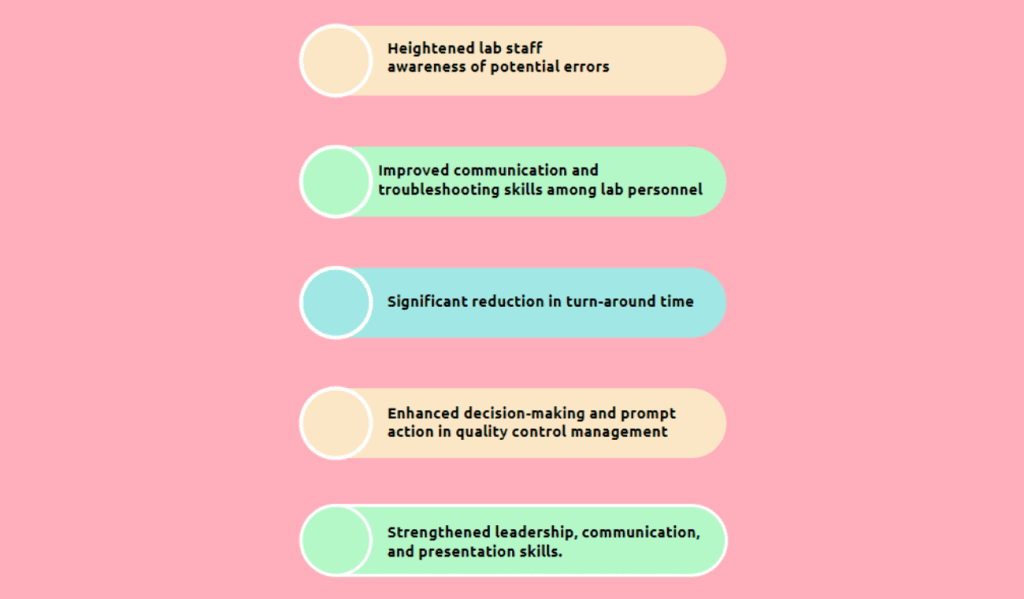Striving for Excellence: Skill Refinement for Error Reduction, Risk Management, and Sustainable Environment in a Lean Laboratory
Read the Magazine in PDF
Abstract:
This article highlights the importance of skill refinement in reducing error rates, managing risk, and ensuring the safety and sustainability of the laboratory environment. The case study focuses on implementing a quality improvement program in the Department of Biochemistry at Tata Memorial Hospital, Mumbai. The program involved developing task-specific groups, adopting task-oriented flowcharts, and evaluating through a point-based system. The results demonstrate improved communication, troubleshooting skills, reduced turn-around, enhanced decision-making, and leadership skills among lab personnel. These achievements contribute to the laboratory’s overall quality management and sustainability, ultimately benefiting patient care.
Organization Profile
Tata Memorial Hospital is a renowned institution dedicated to delivering exceptional cancer care. The primary objective of the Tata Memorial Center is to offer comprehensive cancer care services to all individuals, upholding the values of excellence in service, education, and research. As the leading cancer center in the nation, we play a vital role in shaping national policies and strategies for cancer care. Our approach involves promoting exemplary service based on evidence-based oncology practices, prioritizing affordable, innovative, and contextually relevant research, and ensuring access to cancer education for students, trainees, professionals, employees, and the general public.
Introduction:
A quality improvement program involves a systematic approach implemented by diagnostic laboratories to monitor, evaluate, and enhance their overall quality. To assess the quality standards of a diagnostic laboratory, regular internal and external audits are conducted, along with intra- and inter-departmental reviews, to identify areas of concern. These areas of concern are typically placed within the laboratory’s pre-analytical, analytical, and post-analytical sections based on the scope of work. It has been observed that the most significant improvements in laboratory workflow can be achieved by developing the relevant skills of the existing workforce, thus emphasizing the importance of skill refinement as a critical tool in overall quality enhancement.
Laboratory reports play a critical role in patient care in any healthcare organisation. Any errors or delays in these reports can unintentionally impact diagnostic, therapeutic, and prognostic decisions related to patient treatment. It is crucial for the staff members to possess a solid understanding of the work culture, gain exposure in their field, and consistently refine their skills. These factors are essential for fostering continuous improvement among the staff and ensuring optimal patient care.
To determine the issue:
- Diagnostic laboratories play a central role in serving all clinical departments within a healthcare organization, ensuring the efficient functioning of healthcare services.
- Errors or delays in laboratory reports disrupt the harmonized workflow and can significantly impact patient care.
- Identified issues among staff include communication skills, assuming leadership roles, handling quality control outliers, and effectively managing equipment downtime.
- While staff members are aware of policies, standard operating procedures, and quality management system procedures, there is a need to translate corrective actions into sustainable results.
- Enhancing staff communication and leadership skills is crucial, enabling them to troubleshoot issues and contribute to a sustainable healthcare system.
- General skills improvement should encompass proactive behaviour, time management, professionalism in addressing patient and client queries and identifying and preventing potential hazards to improve safety in the laboratory.
- Adopting such an approach would minimize energy expenditure, reduce risk, and create a more sustainable laboratory environment.
To find the solution to the problem:
- Training and skill development of the laboratory workforce are vital components of healthcare organizations, and refining these skills offers numerous benefits.
- Implemented tools for improving laboratory workflow and maintaining a sustainable working environment include:
- Manpower allocation to specific tasks, creating a versatile workforce.
- Identifying skill gaps and providing regular, targeted training.
- Conducting risk assessments and managing risks
Potential leaders among the lab staff were identified, considering their specific skill sets, and task-specific groups were formed.
Task-oriented flowcharts were adopted to assign short tasks within a specific time frame.
The evaluation used a points-based system to assess task completion. 6. These activities improved intra- and inter-group communication skills, refined leadership skills, and enhanced overall lab functioning synchronised. Identifying technical and general skills needing further training among group members improved goal achievement.
Better identification and resolution of non-conformities, increased proactivity in decision-making, and an agile mindset were observed among lab personnel. These improvements improved total quality management and transformed the lab’s working environment. These efficient changes can be easily replicated and adopted by other healthcare organizations.
he following steps are taken to make sure that the improvements made are secure:
- To ensure quality work, we implemented a point-based system, dividing the workforce into small groups focused on quality management, risk assessment, and process improvement.
- Task-oriented flowcharts were developed and adopted to guide the teams in their specific tasks.
- Each group had assigned leaders who monitored and evaluated the work of their respective teams, providing ratings accordingly.
- As a pilot project, the concept of skill refinement to reduce error reporting, manage risk, and maintain a sustainable working environment was implemented in the Department of Biochemistry at Tata Memorial Hospital in Mumbai.
Outcome
Empowering the workforce through skill refinement for harmonized laboratory workflow and sustainable healthcare results in:
- Skill refinement empowers the workforce, fostering confidence, showcasing competence, and cultivating a problem-solving mindset, all of which contribute to harmonizing the laboratory workflow.
- Diagnostic laboratories play a crucial role in supporting a sustainable healthcare system by optimizing resource utilization from ecological, social, and economic perspectives while ensuring the delivery of high-quality services to end users.

Conclusion:
Skill refinement is vital in optimizing laboratory performance, risk management, and the overall sustainability of healthcare organizations. The case study presented the successful implementation of a quality improvement program in the Department of Biochemistry at Tata Memorial Hospital. Significant improvements were observed in the laboratory workflow by empowering the workforce through skill development, fostering a problem-solving mindset, and enhancing leadership and communication abilities. These improvements contribute to the quality of services provided and establish the foundation for a sustainable healthcare system. The findings and strategies outlined in this case study can serve as a valuable reference for other healthcare organizations seeking to enhance their laboratory operations and promote a culture of continuous improvement.




